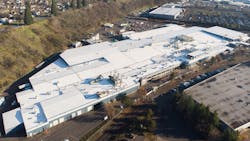DTNA commits to carbon neutral vehicle production by 2025
Daimler Trucks North America (DTNA) announced that its Portland truck manufacturing plant is setting the course for the company’s “green” production in the U.S. by achieving carbon neutral production in 2020 with reduced energy consumption and the offset of on-site emissions. DTNA further plans to incorporate CO2-neutral production at all of its remaining truck manufacturing plants by 2025.
The Portland plant will be the first vehicle manufacturing plant to achieve CO2-neutral production in the global Daimler Trucks network. DTNA is making significant investment in the facility as it prepares for production of the Freightliner eCascadia and Freightliner eM2, the company’s first battery-electric medium and heavy duty trucks planned for the start of series production in 2022.
“The commitment we have to CO2-neutral vehicles starts with how they are produced, and we are on the path to achieving carbon neutral production, beginning with our Portland truck plant in 2020,” said Roger Nielsen, president and CEO, DTNA. “With our quickly growing portfolio of battery-electric vehicles and our transformative work in hydrogen fuel cell commercial vehicles that will be on the road within the decade, our future and our industry’s future is electric.”
Partnerships to achieve carbon neutrality
The Portland plant developed a strategy with local partners that will have a powerful impact. Through a partnership with Energy Trust of Oregon, the plant has reduced its energy consumption from vehicle manufacturing with equipment replacement and facility upgrades. The upcoming implementation of ISO 50001 will ensure further improvement in energy efficiency for the Portland plant.
As a signing member of Portland General Electric’s Green Future Impact program, DTNA has also committed to the purchase of “green” energy from wind and solar power generation, including from the recently announced Pachwáywit fields, slated to be Oregon’s largest solar facility, located in Gilliam County, about 150 miles east of Portland.
“Sustainability is not a new topic for Daimler Trucks North America or for those of us here in Oregon, and we are excited to support our global commitments by getting a head start in our own home town,” said Geoffrey Jansen, plant manager, Portland truck manufacturing plant, DTNA. “This announcement is even more meaningful since we will begin building the all-new electric Freightliner eCascadia and Freightliner eM2 here within the next couple of years.”
Environmental leadership
DTNA is committed to ambitious goals to reduce emissions of CO2 and volatile organic compounds, energy consumption, waste generation, and water consumption in an effort to make a powerful positive environmental impact for the communities in which it does business and on the world as a whole. For Daimler Truck & Buses, sustainability means permanently creating value for all stakeholder groups: for customers, employees, and investors, as well as for business partners and society as a whole.
